Financial Management Report: Auto-Trader and COVID-19 Analysis
VerifiedAdded on 2023/01/06
|10
|3221
|72
Report
AI Summary
This report analyzes the financial management strategies of Auto-Trader during the COVID-19 pandemic. It examines the £200 million equity financing, comparing it with other options like debentures and bank loans, while also addressing the mitigation of the pandemic's impact on working capital and short-term finance. The report explores credit, creditor, and inventory management, along with short, medium, and long-term finance strategies. Furthermore, it evaluates the proposal to cancel dividends, considering the implications for investors through the lens of the Modigliani & Miller approach. The report underscores the importance of financial planning, cash flow management, and strategic decision-making in navigating the crisis.

FINANCIAL MANAGEMENT
Paraphrase This Document
Need a fresh take? Get an instant paraphrase of this document with our AI Paraphraser
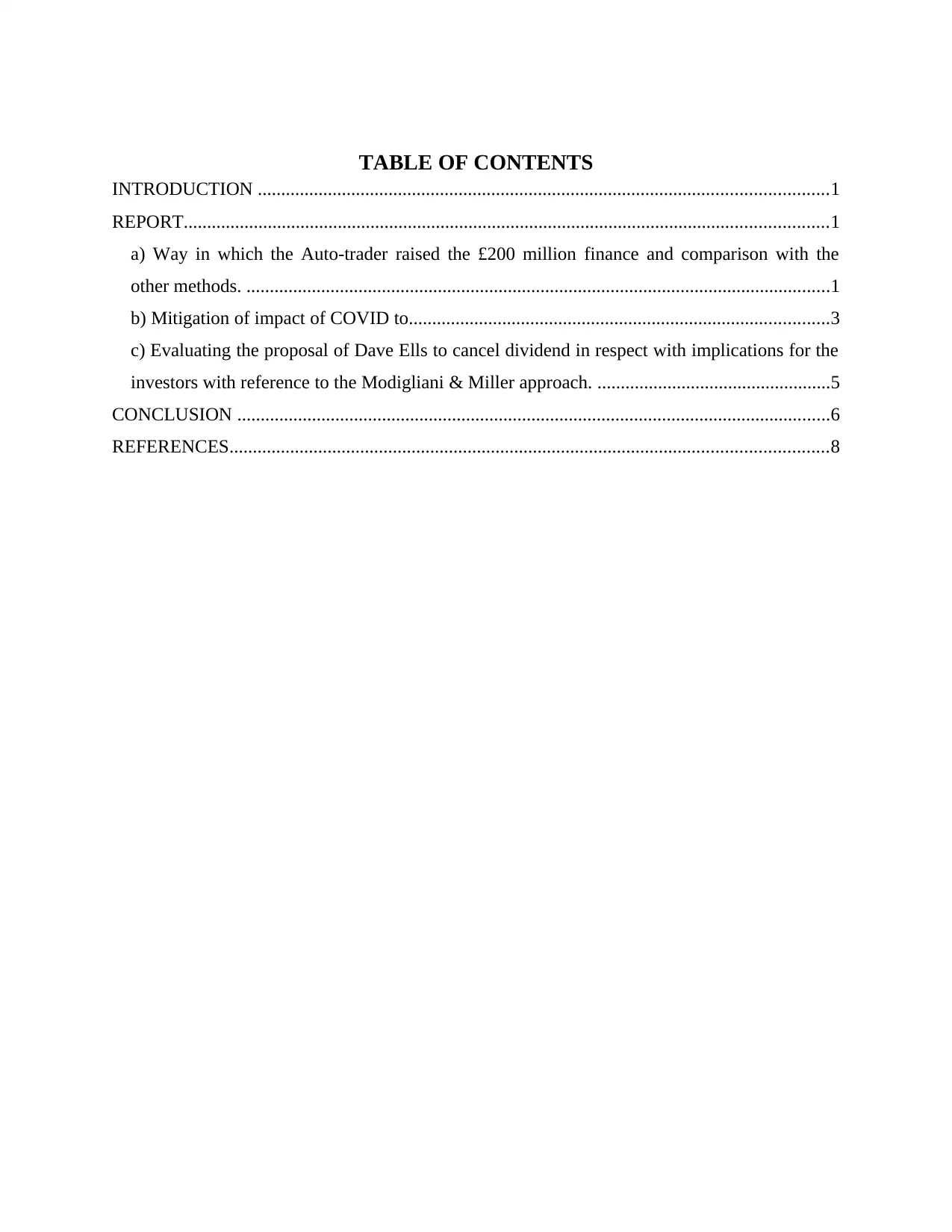
TABLE OF CONTENTS
INTRODUCTION ..........................................................................................................................1
REPORT..........................................................................................................................................1
a) Way in which the Auto-trader raised the £200 million finance and comparison with the
other methods. .............................................................................................................................1
b) Mitigation of impact of COVID to..........................................................................................3
c) Evaluating the proposal of Dave Ells to cancel dividend in respect with implications for the
investors with reference to the Modigliani & Miller approach. ..................................................5
CONCLUSION ...............................................................................................................................6
REFERENCES................................................................................................................................8
INTRODUCTION ..........................................................................................................................1
REPORT..........................................................................................................................................1
a) Way in which the Auto-trader raised the £200 million finance and comparison with the
other methods. .............................................................................................................................1
b) Mitigation of impact of COVID to..........................................................................................3
c) Evaluating the proposal of Dave Ells to cancel dividend in respect with implications for the
investors with reference to the Modigliani & Miller approach. ..................................................5
CONCLUSION ...............................................................................................................................6
REFERENCES................................................................................................................................8
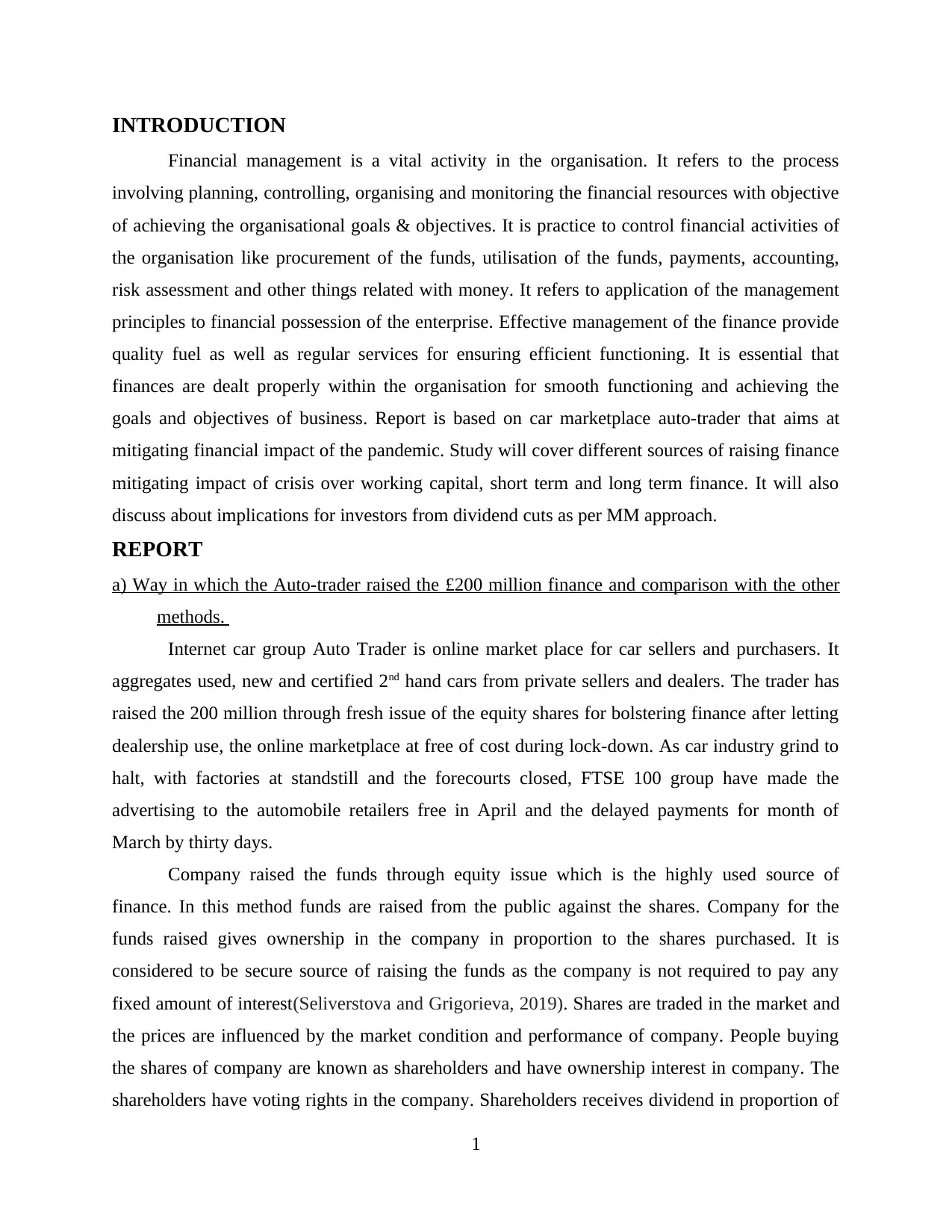
INTRODUCTION
Financial management is a vital activity in the organisation. It refers to the process
involving planning, controlling, organising and monitoring the financial resources with objective
of achieving the organisational goals & objectives. It is practice to control financial activities of
the organisation like procurement of the funds, utilisation of the funds, payments, accounting,
risk assessment and other things related with money. It refers to application of the management
principles to financial possession of the enterprise. Effective management of the finance provide
quality fuel as well as regular services for ensuring efficient functioning. It is essential that
finances are dealt properly within the organisation for smooth functioning and achieving the
goals and objectives of business. Report is based on car marketplace auto-trader that aims at
mitigating financial impact of the pandemic. Study will cover different sources of raising finance
mitigating impact of crisis over working capital, short term and long term finance. It will also
discuss about implications for investors from dividend cuts as per MM approach.
REPORT
a) Way in which the Auto-trader raised the £200 million finance and comparison with the other
methods.
Internet car group Auto Trader is online market place for car sellers and purchasers. It
aggregates used, new and certified 2nd hand cars from private sellers and dealers. The trader has
raised the 200 million through fresh issue of the equity shares for bolstering finance after letting
dealership use, the online marketplace at free of cost during lock-down. As car industry grind to
halt, with factories at standstill and the forecourts closed, FTSE 100 group have made the
advertising to the automobile retailers free in April and the delayed payments for month of
March by thirty days.
Company raised the funds through equity issue which is the highly used source of
finance. In this method funds are raised from the public against the shares. Company for the
funds raised gives ownership in the company in proportion to the shares purchased. It is
considered to be secure source of raising the funds as the company is not required to pay any
fixed amount of interest(Seliverstova and Grigorieva, 2019). Shares are traded in the market and
the prices are influenced by the market condition and performance of company. People buying
the shares of company are known as shareholders and have ownership interest in company. The
shareholders have voting rights in the company. Shareholders receives dividend in proportion of
1
Financial management is a vital activity in the organisation. It refers to the process
involving planning, controlling, organising and monitoring the financial resources with objective
of achieving the organisational goals & objectives. It is practice to control financial activities of
the organisation like procurement of the funds, utilisation of the funds, payments, accounting,
risk assessment and other things related with money. It refers to application of the management
principles to financial possession of the enterprise. Effective management of the finance provide
quality fuel as well as regular services for ensuring efficient functioning. It is essential that
finances are dealt properly within the organisation for smooth functioning and achieving the
goals and objectives of business. Report is based on car marketplace auto-trader that aims at
mitigating financial impact of the pandemic. Study will cover different sources of raising finance
mitigating impact of crisis over working capital, short term and long term finance. It will also
discuss about implications for investors from dividend cuts as per MM approach.
REPORT
a) Way in which the Auto-trader raised the £200 million finance and comparison with the other
methods.
Internet car group Auto Trader is online market place for car sellers and purchasers. It
aggregates used, new and certified 2nd hand cars from private sellers and dealers. The trader has
raised the 200 million through fresh issue of the equity shares for bolstering finance after letting
dealership use, the online marketplace at free of cost during lock-down. As car industry grind to
halt, with factories at standstill and the forecourts closed, FTSE 100 group have made the
advertising to the automobile retailers free in April and the delayed payments for month of
March by thirty days.
Company raised the funds through equity issue which is the highly used source of
finance. In this method funds are raised from the public against the shares. Company for the
funds raised gives ownership in the company in proportion to the shares purchased. It is
considered to be secure source of raising the funds as the company is not required to pay any
fixed amount of interest(Seliverstova and Grigorieva, 2019). Shares are traded in the market and
the prices are influenced by the market condition and performance of company. People buying
the shares of company are known as shareholders and have ownership interest in company. The
shareholders have voting rights in the company. Shareholders receives dividend in proportion of
1
⊘ This is a preview!⊘
Do you want full access?
Subscribe today to unlock all pages.

Trusted by 1+ million students worldwide
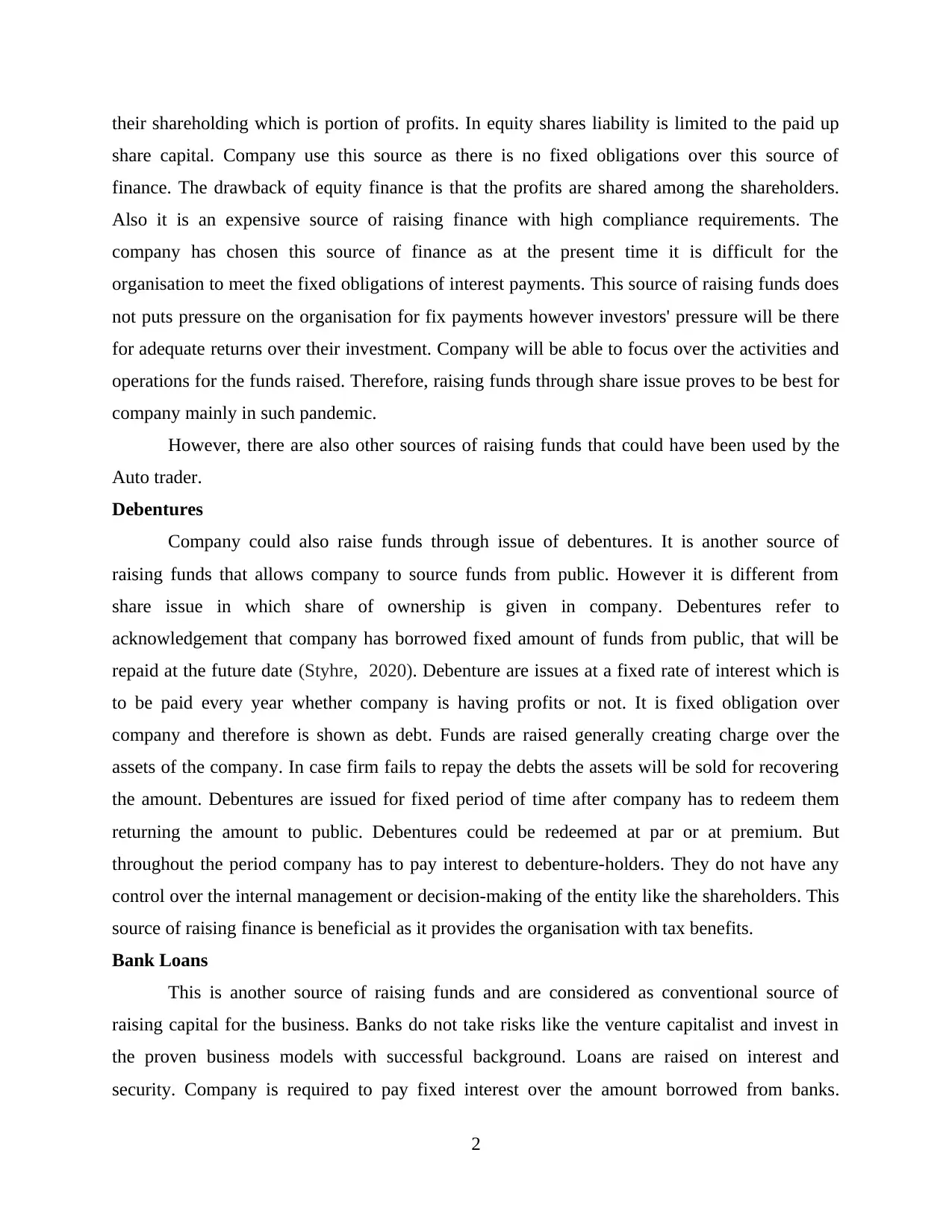
their shareholding which is portion of profits. In equity shares liability is limited to the paid up
share capital. Company use this source as there is no fixed obligations over this source of
finance. The drawback of equity finance is that the profits are shared among the shareholders.
Also it is an expensive source of raising finance with high compliance requirements. The
company has chosen this source of finance as at the present time it is difficult for the
organisation to meet the fixed obligations of interest payments. This source of raising funds does
not puts pressure on the organisation for fix payments however investors' pressure will be there
for adequate returns over their investment. Company will be able to focus over the activities and
operations for the funds raised. Therefore, raising funds through share issue proves to be best for
company mainly in such pandemic.
However, there are also other sources of raising funds that could have been used by the
Auto trader.
Debentures
Company could also raise funds through issue of debentures. It is another source of
raising funds that allows company to source funds from public. However it is different from
share issue in which share of ownership is given in company. Debentures refer to
acknowledgement that company has borrowed fixed amount of funds from public, that will be
repaid at the future date (Styhre, 2020). Debenture are issues at a fixed rate of interest which is
to be paid every year whether company is having profits or not. It is fixed obligation over
company and therefore is shown as debt. Funds are raised generally creating charge over the
assets of the company. In case firm fails to repay the debts the assets will be sold for recovering
the amount. Debentures are issued for fixed period of time after company has to redeem them
returning the amount to public. Debentures could be redeemed at par or at premium. But
throughout the period company has to pay interest to debenture-holders. They do not have any
control over the internal management or decision-making of the entity like the shareholders. This
source of raising finance is beneficial as it provides the organisation with tax benefits.
Bank Loans
This is another source of raising funds and are considered as conventional source of
raising capital for the business. Banks do not take risks like the venture capitalist and invest in
the proven business models with successful background. Loans are raised on interest and
security. Company is required to pay fixed interest over the amount borrowed from banks.
2
share capital. Company use this source as there is no fixed obligations over this source of
finance. The drawback of equity finance is that the profits are shared among the shareholders.
Also it is an expensive source of raising finance with high compliance requirements. The
company has chosen this source of finance as at the present time it is difficult for the
organisation to meet the fixed obligations of interest payments. This source of raising funds does
not puts pressure on the organisation for fix payments however investors' pressure will be there
for adequate returns over their investment. Company will be able to focus over the activities and
operations for the funds raised. Therefore, raising funds through share issue proves to be best for
company mainly in such pandemic.
However, there are also other sources of raising funds that could have been used by the
Auto trader.
Debentures
Company could also raise funds through issue of debentures. It is another source of
raising funds that allows company to source funds from public. However it is different from
share issue in which share of ownership is given in company. Debentures refer to
acknowledgement that company has borrowed fixed amount of funds from public, that will be
repaid at the future date (Styhre, 2020). Debenture are issues at a fixed rate of interest which is
to be paid every year whether company is having profits or not. It is fixed obligation over
company and therefore is shown as debt. Funds are raised generally creating charge over the
assets of the company. In case firm fails to repay the debts the assets will be sold for recovering
the amount. Debentures are issued for fixed period of time after company has to redeem them
returning the amount to public. Debentures could be redeemed at par or at premium. But
throughout the period company has to pay interest to debenture-holders. They do not have any
control over the internal management or decision-making of the entity like the shareholders. This
source of raising finance is beneficial as it provides the organisation with tax benefits.
Bank Loans
This is another source of raising funds and are considered as conventional source of
raising capital for the business. Banks do not take risks like the venture capitalist and invest in
the proven business models with successful background. Loans are raised on interest and
security. Company is required to pay fixed interest over the amount borrowed from banks.
2
Paraphrase This Document
Need a fresh take? Get an instant paraphrase of this document with our AI Paraphraser
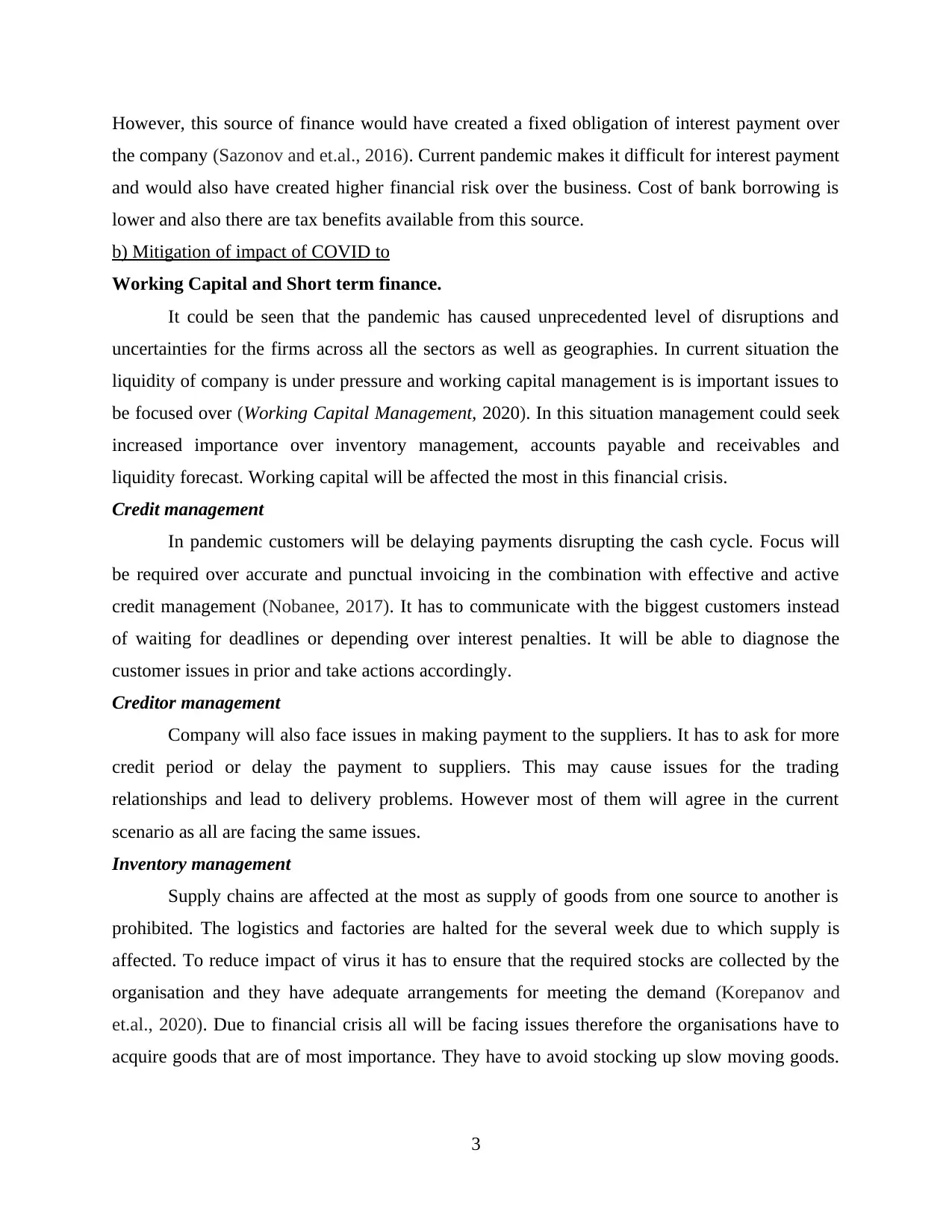
However, this source of finance would have created a fixed obligation of interest payment over
the company (Sazonov and et.al., 2016). Current pandemic makes it difficult for interest payment
and would also have created higher financial risk over the business. Cost of bank borrowing is
lower and also there are tax benefits available from this source.
b) Mitigation of impact of COVID to
Working Capital and Short term finance.
It could be seen that the pandemic has caused unprecedented level of disruptions and
uncertainties for the firms across all the sectors as well as geographies. In current situation the
liquidity of company is under pressure and working capital management is is important issues to
be focused over (Working Capital Management, 2020). In this situation management could seek
increased importance over inventory management, accounts payable and receivables and
liquidity forecast. Working capital will be affected the most in this financial crisis.
Credit management
In pandemic customers will be delaying payments disrupting the cash cycle. Focus will
be required over accurate and punctual invoicing in the combination with effective and active
credit management (Nobanee, 2017). It has to communicate with the biggest customers instead
of waiting for deadlines or depending over interest penalties. It will be able to diagnose the
customer issues in prior and take actions accordingly.
Creditor management
Company will also face issues in making payment to the suppliers. It has to ask for more
credit period or delay the payment to suppliers. This may cause issues for the trading
relationships and lead to delivery problems. However most of them will agree in the current
scenario as all are facing the same issues.
Inventory management
Supply chains are affected at the most as supply of goods from one source to another is
prohibited. The logistics and factories are halted for the several week due to which supply is
affected. To reduce impact of virus it has to ensure that the required stocks are collected by the
organisation and they have adequate arrangements for meeting the demand (Korepanov and
et.al., 2020). Due to financial crisis all will be facing issues therefore the organisations have to
acquire goods that are of most importance. They have to avoid stocking up slow moving goods.
3
the company (Sazonov and et.al., 2016). Current pandemic makes it difficult for interest payment
and would also have created higher financial risk over the business. Cost of bank borrowing is
lower and also there are tax benefits available from this source.
b) Mitigation of impact of COVID to
Working Capital and Short term finance.
It could be seen that the pandemic has caused unprecedented level of disruptions and
uncertainties for the firms across all the sectors as well as geographies. In current situation the
liquidity of company is under pressure and working capital management is is important issues to
be focused over (Working Capital Management, 2020). In this situation management could seek
increased importance over inventory management, accounts payable and receivables and
liquidity forecast. Working capital will be affected the most in this financial crisis.
Credit management
In pandemic customers will be delaying payments disrupting the cash cycle. Focus will
be required over accurate and punctual invoicing in the combination with effective and active
credit management (Nobanee, 2017). It has to communicate with the biggest customers instead
of waiting for deadlines or depending over interest penalties. It will be able to diagnose the
customer issues in prior and take actions accordingly.
Creditor management
Company will also face issues in making payment to the suppliers. It has to ask for more
credit period or delay the payment to suppliers. This may cause issues for the trading
relationships and lead to delivery problems. However most of them will agree in the current
scenario as all are facing the same issues.
Inventory management
Supply chains are affected at the most as supply of goods from one source to another is
prohibited. The logistics and factories are halted for the several week due to which supply is
affected. To reduce impact of virus it has to ensure that the required stocks are collected by the
organisation and they have adequate arrangements for meeting the demand (Korepanov and
et.al., 2020). Due to financial crisis all will be facing issues therefore the organisations have to
acquire goods that are of most importance. They have to avoid stocking up slow moving goods.
3
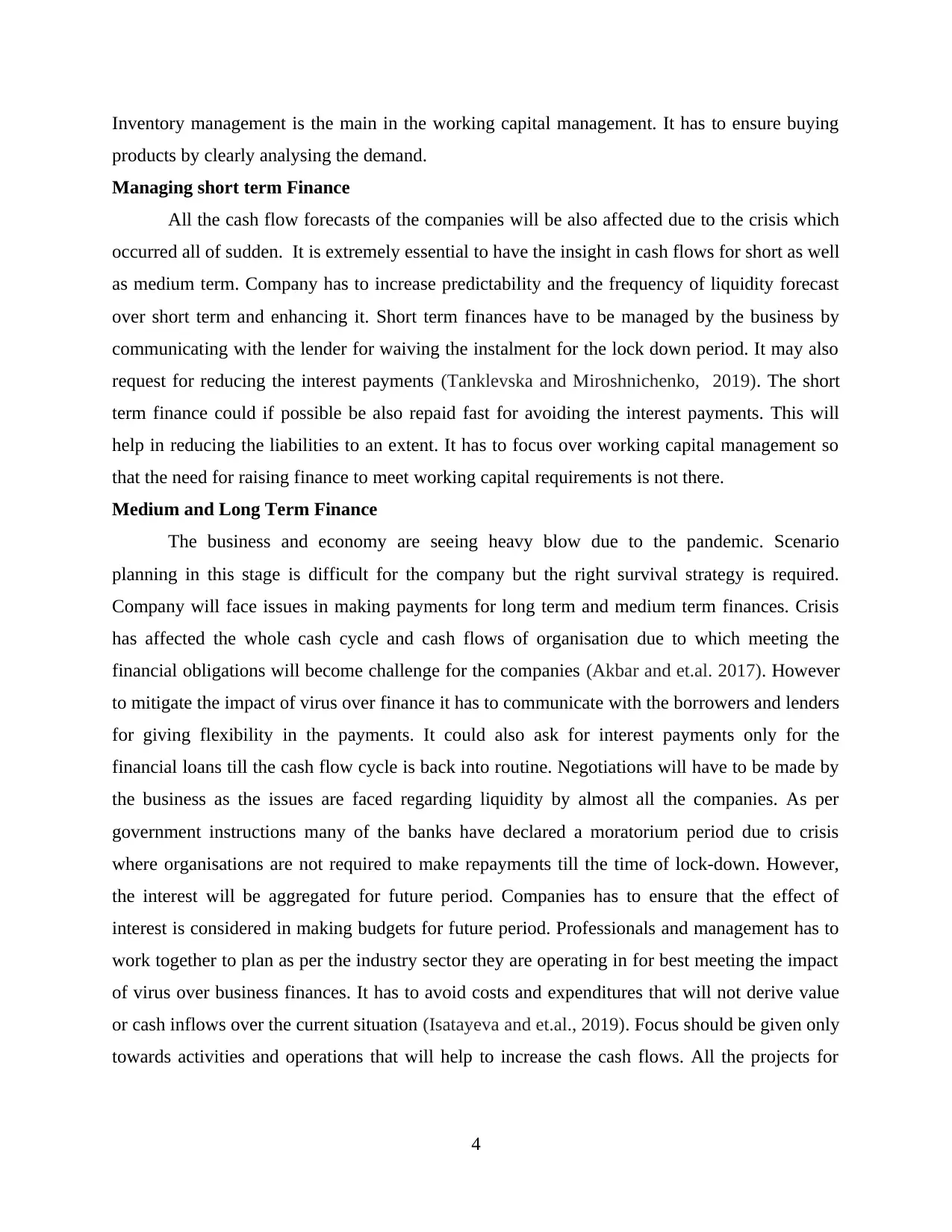
Inventory management is the main in the working capital management. It has to ensure buying
products by clearly analysing the demand.
Managing short term Finance
All the cash flow forecasts of the companies will be also affected due to the crisis which
occurred all of sudden. It is extremely essential to have the insight in cash flows for short as well
as medium term. Company has to increase predictability and the frequency of liquidity forecast
over short term and enhancing it. Short term finances have to be managed by the business by
communicating with the lender for waiving the instalment for the lock down period. It may also
request for reducing the interest payments (Tanklevska and Miroshnichenko, 2019). The short
term finance could if possible be also repaid fast for avoiding the interest payments. This will
help in reducing the liabilities to an extent. It has to focus over working capital management so
that the need for raising finance to meet working capital requirements is not there.
Medium and Long Term Finance
The business and economy are seeing heavy blow due to the pandemic. Scenario
planning in this stage is difficult for the company but the right survival strategy is required.
Company will face issues in making payments for long term and medium term finances. Crisis
has affected the whole cash cycle and cash flows of organisation due to which meeting the
financial obligations will become challenge for the companies (Akbar and et.al. 2017). However
to mitigate the impact of virus over finance it has to communicate with the borrowers and lenders
for giving flexibility in the payments. It could also ask for interest payments only for the
financial loans till the cash flow cycle is back into routine. Negotiations will have to be made by
the business as the issues are faced regarding liquidity by almost all the companies. As per
government instructions many of the banks have declared a moratorium period due to crisis
where organisations are not required to make repayments till the time of lock-down. However,
the interest will be aggregated for future period. Companies has to ensure that the effect of
interest is considered in making budgets for future period. Professionals and management has to
work together to plan as per the industry sector they are operating in for best meeting the impact
of virus over business finances. It has to avoid costs and expenditures that will not derive value
or cash inflows over the current situation (Isatayeva and et.al., 2019). Focus should be given only
towards activities and operations that will help to increase the cash flows. All the projects for
4
products by clearly analysing the demand.
Managing short term Finance
All the cash flow forecasts of the companies will be also affected due to the crisis which
occurred all of sudden. It is extremely essential to have the insight in cash flows for short as well
as medium term. Company has to increase predictability and the frequency of liquidity forecast
over short term and enhancing it. Short term finances have to be managed by the business by
communicating with the lender for waiving the instalment for the lock down period. It may also
request for reducing the interest payments (Tanklevska and Miroshnichenko, 2019). The short
term finance could if possible be also repaid fast for avoiding the interest payments. This will
help in reducing the liabilities to an extent. It has to focus over working capital management so
that the need for raising finance to meet working capital requirements is not there.
Medium and Long Term Finance
The business and economy are seeing heavy blow due to the pandemic. Scenario
planning in this stage is difficult for the company but the right survival strategy is required.
Company will face issues in making payments for long term and medium term finances. Crisis
has affected the whole cash cycle and cash flows of organisation due to which meeting the
financial obligations will become challenge for the companies (Akbar and et.al. 2017). However
to mitigate the impact of virus over finance it has to communicate with the borrowers and lenders
for giving flexibility in the payments. It could also ask for interest payments only for the
financial loans till the cash flow cycle is back into routine. Negotiations will have to be made by
the business as the issues are faced regarding liquidity by almost all the companies. As per
government instructions many of the banks have declared a moratorium period due to crisis
where organisations are not required to make repayments till the time of lock-down. However,
the interest will be aggregated for future period. Companies has to ensure that the effect of
interest is considered in making budgets for future period. Professionals and management has to
work together to plan as per the industry sector they are operating in for best meeting the impact
of virus over business finances. It has to avoid costs and expenditures that will not derive value
or cash inflows over the current situation (Isatayeva and et.al., 2019). Focus should be given only
towards activities and operations that will help to increase the cash flows. All the projects for
4
⊘ This is a preview!⊘
Do you want full access?
Subscribe today to unlock all pages.

Trusted by 1+ million students worldwide
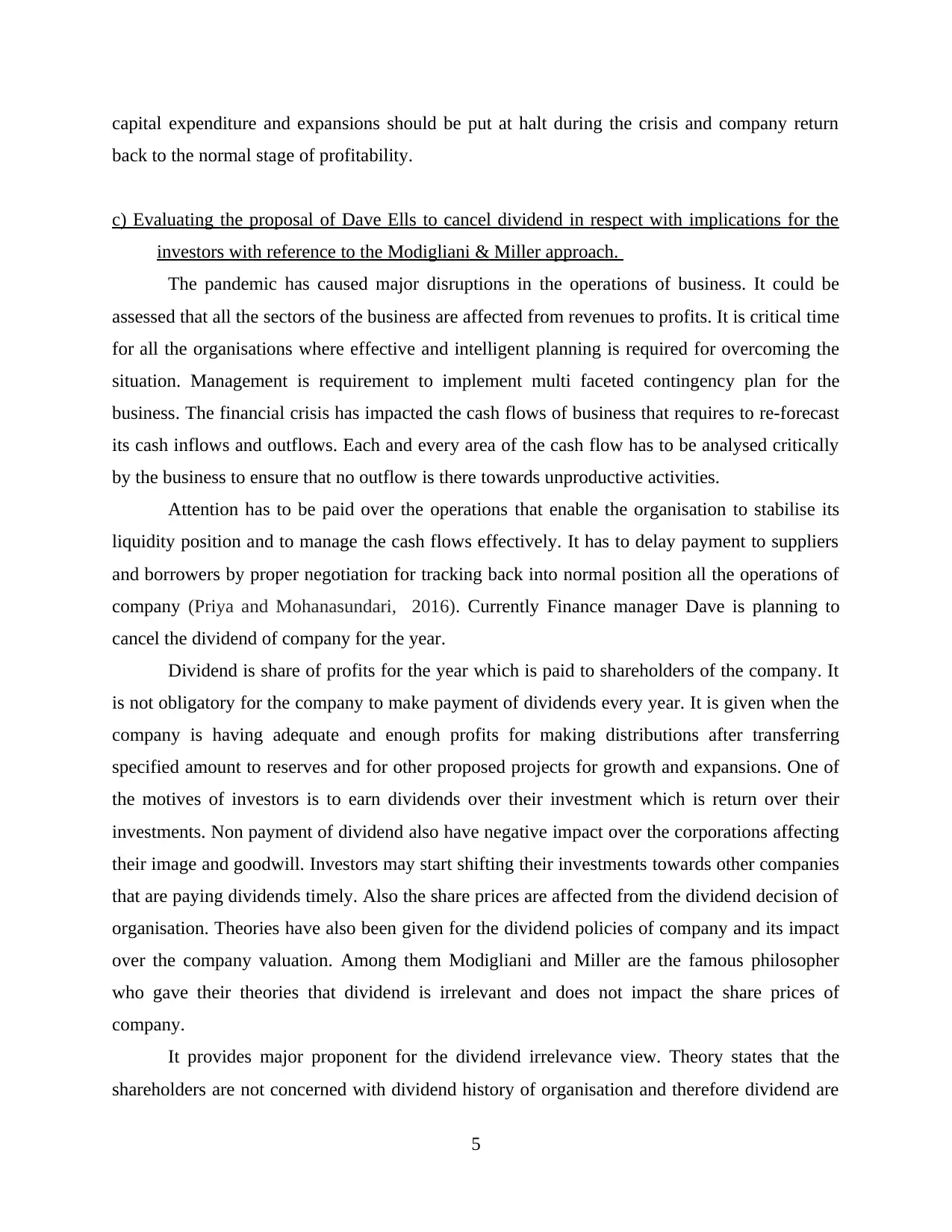
capital expenditure and expansions should be put at halt during the crisis and company return
back to the normal stage of profitability.
c) Evaluating the proposal of Dave Ells to cancel dividend in respect with implications for the
investors with reference to the Modigliani & Miller approach.
The pandemic has caused major disruptions in the operations of business. It could be
assessed that all the sectors of the business are affected from revenues to profits. It is critical time
for all the organisations where effective and intelligent planning is required for overcoming the
situation. Management is requirement to implement multi faceted contingency plan for the
business. The financial crisis has impacted the cash flows of business that requires to re-forecast
its cash inflows and outflows. Each and every area of the cash flow has to be analysed critically
by the business to ensure that no outflow is there towards unproductive activities.
Attention has to be paid over the operations that enable the organisation to stabilise its
liquidity position and to manage the cash flows effectively. It has to delay payment to suppliers
and borrowers by proper negotiation for tracking back into normal position all the operations of
company (Priya and Mohanasundari, 2016). Currently Finance manager Dave is planning to
cancel the dividend of company for the year.
Dividend is share of profits for the year which is paid to shareholders of the company. It
is not obligatory for the company to make payment of dividends every year. It is given when the
company is having adequate and enough profits for making distributions after transferring
specified amount to reserves and for other proposed projects for growth and expansions. One of
the motives of investors is to earn dividends over their investment which is return over their
investments. Non payment of dividend also have negative impact over the corporations affecting
their image and goodwill. Investors may start shifting their investments towards other companies
that are paying dividends timely. Also the share prices are affected from the dividend decision of
organisation. Theories have also been given for the dividend policies of company and its impact
over the company valuation. Among them Modigliani and Miller are the famous philosopher
who gave their theories that dividend is irrelevant and does not impact the share prices of
company.
It provides major proponent for the dividend irrelevance view. Theory states that the
shareholders are not concerned with dividend history of organisation and therefore dividend are
5
back to the normal stage of profitability.
c) Evaluating the proposal of Dave Ells to cancel dividend in respect with implications for the
investors with reference to the Modigliani & Miller approach.
The pandemic has caused major disruptions in the operations of business. It could be
assessed that all the sectors of the business are affected from revenues to profits. It is critical time
for all the organisations where effective and intelligent planning is required for overcoming the
situation. Management is requirement to implement multi faceted contingency plan for the
business. The financial crisis has impacted the cash flows of business that requires to re-forecast
its cash inflows and outflows. Each and every area of the cash flow has to be analysed critically
by the business to ensure that no outflow is there towards unproductive activities.
Attention has to be paid over the operations that enable the organisation to stabilise its
liquidity position and to manage the cash flows effectively. It has to delay payment to suppliers
and borrowers by proper negotiation for tracking back into normal position all the operations of
company (Priya and Mohanasundari, 2016). Currently Finance manager Dave is planning to
cancel the dividend of company for the year.
Dividend is share of profits for the year which is paid to shareholders of the company. It
is not obligatory for the company to make payment of dividends every year. It is given when the
company is having adequate and enough profits for making distributions after transferring
specified amount to reserves and for other proposed projects for growth and expansions. One of
the motives of investors is to earn dividends over their investment which is return over their
investments. Non payment of dividend also have negative impact over the corporations affecting
their image and goodwill. Investors may start shifting their investments towards other companies
that are paying dividends timely. Also the share prices are affected from the dividend decision of
organisation. Theories have also been given for the dividend policies of company and its impact
over the company valuation. Among them Modigliani and Miller are the famous philosopher
who gave their theories that dividend is irrelevant and does not impact the share prices of
company.
It provides major proponent for the dividend irrelevance view. Theory states that the
shareholders are not concerned with dividend history of organisation and therefore dividend are
5
Paraphrase This Document
Need a fresh take? Get an instant paraphrase of this document with our AI Paraphraser
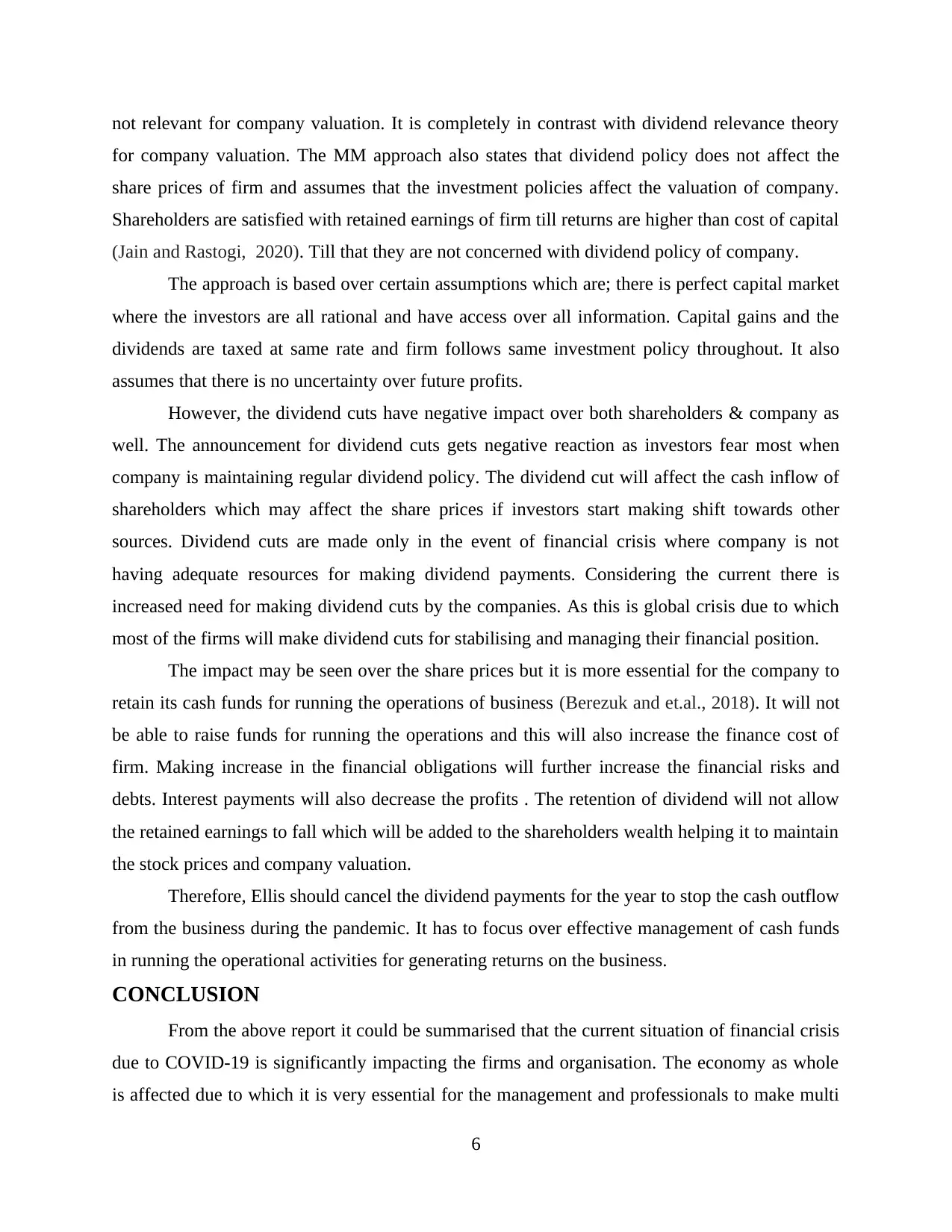
not relevant for company valuation. It is completely in contrast with dividend relevance theory
for company valuation. The MM approach also states that dividend policy does not affect the
share prices of firm and assumes that the investment policies affect the valuation of company.
Shareholders are satisfied with retained earnings of firm till returns are higher than cost of capital
(Jain and Rastogi, 2020). Till that they are not concerned with dividend policy of company.
The approach is based over certain assumptions which are; there is perfect capital market
where the investors are all rational and have access over all information. Capital gains and the
dividends are taxed at same rate and firm follows same investment policy throughout. It also
assumes that there is no uncertainty over future profits.
However, the dividend cuts have negative impact over both shareholders & company as
well. The announcement for dividend cuts gets negative reaction as investors fear most when
company is maintaining regular dividend policy. The dividend cut will affect the cash inflow of
shareholders which may affect the share prices if investors start making shift towards other
sources. Dividend cuts are made only in the event of financial crisis where company is not
having adequate resources for making dividend payments. Considering the current there is
increased need for making dividend cuts by the companies. As this is global crisis due to which
most of the firms will make dividend cuts for stabilising and managing their financial position.
The impact may be seen over the share prices but it is more essential for the company to
retain its cash funds for running the operations of business (Berezuk and et.al., 2018). It will not
be able to raise funds for running the operations and this will also increase the finance cost of
firm. Making increase in the financial obligations will further increase the financial risks and
debts. Interest payments will also decrease the profits . The retention of dividend will not allow
the retained earnings to fall which will be added to the shareholders wealth helping it to maintain
the stock prices and company valuation.
Therefore, Ellis should cancel the dividend payments for the year to stop the cash outflow
from the business during the pandemic. It has to focus over effective management of cash funds
in running the operational activities for generating returns on the business.
CONCLUSION
From the above report it could be summarised that the current situation of financial crisis
due to COVID-19 is significantly impacting the firms and organisation. The economy as whole
is affected due to which it is very essential for the management and professionals to make multi
6
for company valuation. The MM approach also states that dividend policy does not affect the
share prices of firm and assumes that the investment policies affect the valuation of company.
Shareholders are satisfied with retained earnings of firm till returns are higher than cost of capital
(Jain and Rastogi, 2020). Till that they are not concerned with dividend policy of company.
The approach is based over certain assumptions which are; there is perfect capital market
where the investors are all rational and have access over all information. Capital gains and the
dividends are taxed at same rate and firm follows same investment policy throughout. It also
assumes that there is no uncertainty over future profits.
However, the dividend cuts have negative impact over both shareholders & company as
well. The announcement for dividend cuts gets negative reaction as investors fear most when
company is maintaining regular dividend policy. The dividend cut will affect the cash inflow of
shareholders which may affect the share prices if investors start making shift towards other
sources. Dividend cuts are made only in the event of financial crisis where company is not
having adequate resources for making dividend payments. Considering the current there is
increased need for making dividend cuts by the companies. As this is global crisis due to which
most of the firms will make dividend cuts for stabilising and managing their financial position.
The impact may be seen over the share prices but it is more essential for the company to
retain its cash funds for running the operations of business (Berezuk and et.al., 2018). It will not
be able to raise funds for running the operations and this will also increase the finance cost of
firm. Making increase in the financial obligations will further increase the financial risks and
debts. Interest payments will also decrease the profits . The retention of dividend will not allow
the retained earnings to fall which will be added to the shareholders wealth helping it to maintain
the stock prices and company valuation.
Therefore, Ellis should cancel the dividend payments for the year to stop the cash outflow
from the business during the pandemic. It has to focus over effective management of cash funds
in running the operational activities for generating returns on the business.
CONCLUSION
From the above report it could be summarised that the current situation of financial crisis
due to COVID-19 is significantly impacting the firms and organisation. The economy as whole
is affected due to which it is very essential for the management and professionals to make multi
6

faceted plans for protecting and enabling the company to deal with crisis effectively. It has to
ensure that the cash flows are only towards activities which are most essential for the business
and will help in bringing further cash flows.
7
ensure that the cash flows are only towards activities which are most essential for the business
and will help in bringing further cash flows.
7
⊘ This is a preview!⊘
Do you want full access?
Subscribe today to unlock all pages.

Trusted by 1+ million students worldwide
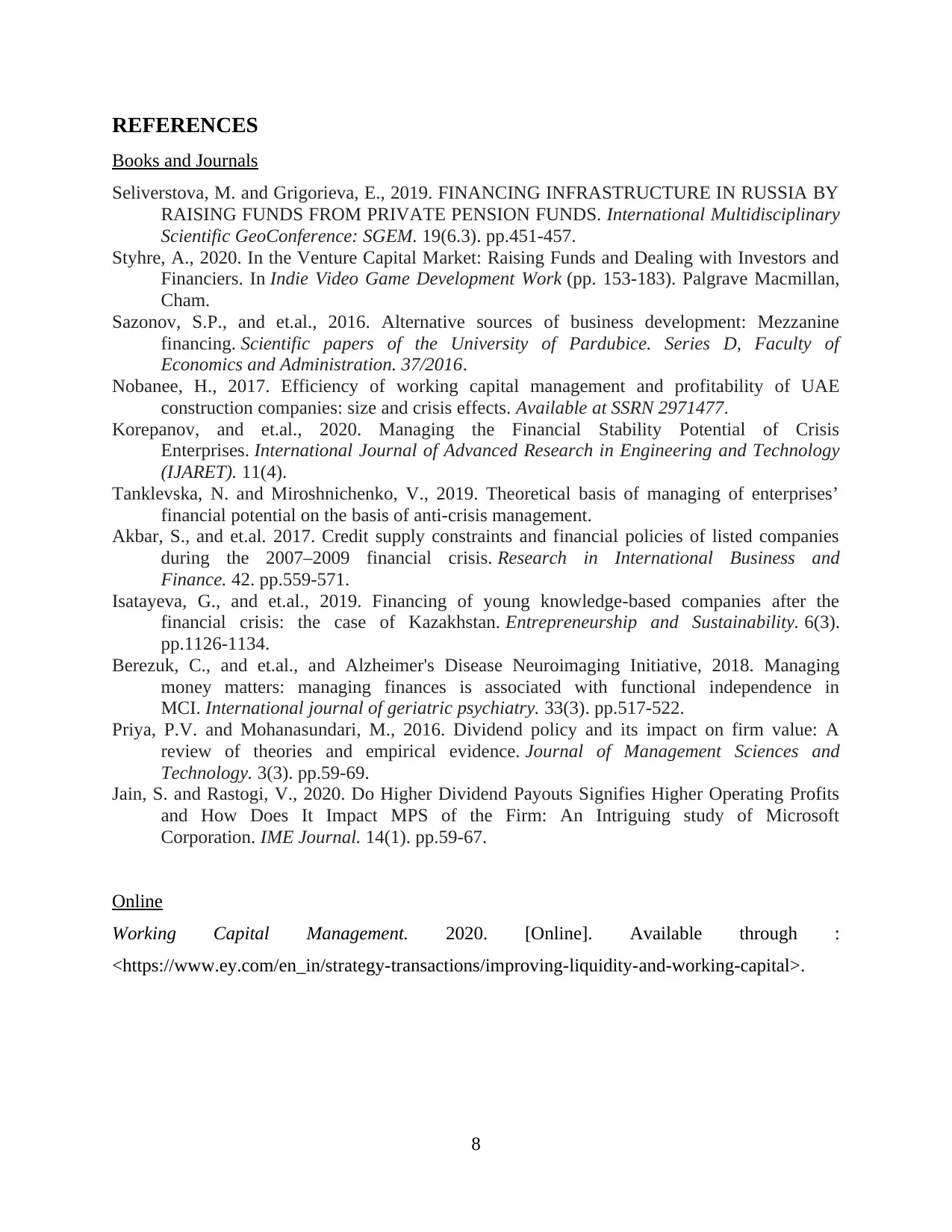
REFERENCES
Books and Journals
Seliverstova, M. and Grigorieva, E., 2019. FINANCING INFRASTRUCTURE IN RUSSIA BY
RAISING FUNDS FROM PRIVATE PENSION FUNDS. International Multidisciplinary
Scientific GeoConference: SGEM. 19(6.3). pp.451-457.
Styhre, A., 2020. In the Venture Capital Market: Raising Funds and Dealing with Investors and
Financiers. In Indie Video Game Development Work (pp. 153-183). Palgrave Macmillan,
Cham.
Sazonov, S.P., and et.al., 2016. Alternative sources of business development: Mezzanine
financing. Scientific papers of the University of Pardubice. Series D, Faculty of
Economics and Administration. 37/2016.
Nobanee, H., 2017. Efficiency of working capital management and profitability of UAE
construction companies: size and crisis effects. Available at SSRN 2971477.
Korepanov, and et.al., 2020. Managing the Financial Stability Potential of Crisis
Enterprises. International Journal of Advanced Research in Engineering and Technology
(IJARET). 11(4).
Tanklevska, N. and Miroshnichenko, V., 2019. Theoretical basis of managing of enterprises’
financial potential on the basis of anti-crisis management.
Akbar, S., and et.al. 2017. Credit supply constraints and financial policies of listed companies
during the 2007–2009 financial crisis. Research in International Business and
Finance. 42. pp.559-571.
Isatayeva, G., and et.al., 2019. Financing of young knowledge-based companies after the
financial crisis: the case of Kazakhstan. Entrepreneurship and Sustainability. 6(3).
pp.1126-1134.
Berezuk, C., and et.al., and Alzheimer's Disease Neuroimaging Initiative, 2018. Managing
money matters: managing finances is associated with functional independence in
MCI. International journal of geriatric psychiatry. 33(3). pp.517-522.
Priya, P.V. and Mohanasundari, M., 2016. Dividend policy and its impact on firm value: A
review of theories and empirical evidence. Journal of Management Sciences and
Technology. 3(3). pp.59-69.
Jain, S. and Rastogi, V., 2020. Do Higher Dividend Payouts Signifies Higher Operating Profits
and How Does It Impact MPS of the Firm: An Intriguing study of Microsoft
Corporation. IME Journal. 14(1). pp.59-67.
Online
Working Capital Management. 2020. [Online]. Available through :
<https://www.ey.com/en_in/strategy-transactions/improving-liquidity-and-working-capital>.
8
Books and Journals
Seliverstova, M. and Grigorieva, E., 2019. FINANCING INFRASTRUCTURE IN RUSSIA BY
RAISING FUNDS FROM PRIVATE PENSION FUNDS. International Multidisciplinary
Scientific GeoConference: SGEM. 19(6.3). pp.451-457.
Styhre, A., 2020. In the Venture Capital Market: Raising Funds and Dealing with Investors and
Financiers. In Indie Video Game Development Work (pp. 153-183). Palgrave Macmillan,
Cham.
Sazonov, S.P., and et.al., 2016. Alternative sources of business development: Mezzanine
financing. Scientific papers of the University of Pardubice. Series D, Faculty of
Economics and Administration. 37/2016.
Nobanee, H., 2017. Efficiency of working capital management and profitability of UAE
construction companies: size and crisis effects. Available at SSRN 2971477.
Korepanov, and et.al., 2020. Managing the Financial Stability Potential of Crisis
Enterprises. International Journal of Advanced Research in Engineering and Technology
(IJARET). 11(4).
Tanklevska, N. and Miroshnichenko, V., 2019. Theoretical basis of managing of enterprises’
financial potential on the basis of anti-crisis management.
Akbar, S., and et.al. 2017. Credit supply constraints and financial policies of listed companies
during the 2007–2009 financial crisis. Research in International Business and
Finance. 42. pp.559-571.
Isatayeva, G., and et.al., 2019. Financing of young knowledge-based companies after the
financial crisis: the case of Kazakhstan. Entrepreneurship and Sustainability. 6(3).
pp.1126-1134.
Berezuk, C., and et.al., and Alzheimer's Disease Neuroimaging Initiative, 2018. Managing
money matters: managing finances is associated with functional independence in
MCI. International journal of geriatric psychiatry. 33(3). pp.517-522.
Priya, P.V. and Mohanasundari, M., 2016. Dividend policy and its impact on firm value: A
review of theories and empirical evidence. Journal of Management Sciences and
Technology. 3(3). pp.59-69.
Jain, S. and Rastogi, V., 2020. Do Higher Dividend Payouts Signifies Higher Operating Profits
and How Does It Impact MPS of the Firm: An Intriguing study of Microsoft
Corporation. IME Journal. 14(1). pp.59-67.
Online
Working Capital Management. 2020. [Online]. Available through :
<https://www.ey.com/en_in/strategy-transactions/improving-liquidity-and-working-capital>.
8
1 out of 10
Related Documents
Your All-in-One AI-Powered Toolkit for Academic Success.
+13062052269
info@desklib.com
Available 24*7 on WhatsApp / Email
![[object Object]](/_next/static/media/star-bottom.7253800d.svg)
Unlock your academic potential
Copyright © 2020–2026 A2Z Services. All Rights Reserved. Developed and managed by ZUCOL.



